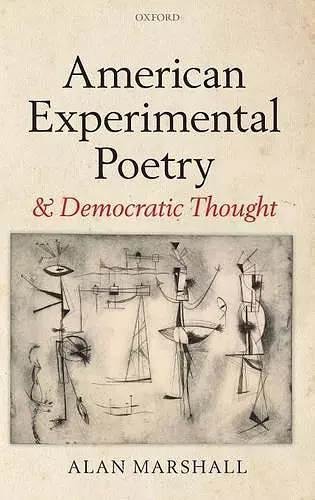American Experimental Poetry and Democratic Thought
Format:Hardback
Publisher:Oxford University Press
Published:12th Nov '09
Currently unavailable, and unfortunately no date known when it will be back

Alan Marshall takes Alexis de Tocqueville's discussion of 'Some Sources of Poetic Inspiration in Democracies' in the second volume of his Democracy in America as the starting point for a wide-ranging examination of the nature of democratic thought and expression in American experimental poetry, from Walt Whitman and Emily Dickinson in the mid-nineteenth century, to George Oppen, Frank O'Hara, and Robert Creeley a century later. The book begins by considering the political significance of what Marshall describes as 'the invisible physiognomy' of Whitman's poetry, which is followed by a re-evaluation of the flawed republican humanism of Ezra Pound in the light of the thought of Hannah Arendt. Other chapters deal with Mina Loy, Lorine Niedecker, Wallace Stevens, William Carlos Williams, and Muriel Rukeyser. The book argues against the narrowly ideological interpretation of politics that dominates contemporary literary studies. To that extent it recalls Tocquevilles concern to underline the differences between his own methods and perspectives and the historical determinism of his contemporaries. Marshall brings together an exceptional variety of theoretical writing, including works by Theodor Adorno, Seyla Benhabib, Stanley Cavell, Sigmund Freud, Martin Heidegger, Immanuel Kant, James Madison, Karl Marx, David Riesman, and Donald Winnicott, as he seeks to expand and develop Tocqueville's circumspect humanist critical trajectory. The chapters are conceived as a series of innovative dialogical constellations, to which the close reading of poetry is central. The aim throughout is to measure the thought of the poets or their poems against the thoughts of those who are more often called thinkers.
The intellectual fields that Marshall sketches are explosive, expansive environments ... No poet could wish for a more splendid reception than that managed by Marshall * Edward Brunner, American Literary History *
impressive, erudite... Marshall's book flashes brilliantly * David Gewanter, Times Higher Education *
ISBN: 9780199561926
Dimensions: 241mm x 161mm x 24mm
Weight: 665g
328 pages